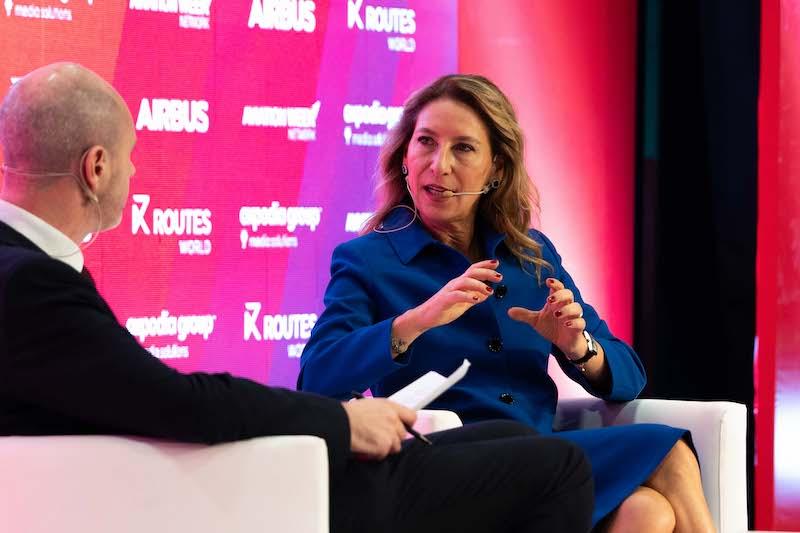
Routes Editor-in-Chief David Casey speaks with Pegasus Airlines CEO Güliz Öztürk at Routes World 2023.
ISTANBUL—Turkish LCC Pegasus Airlines is considering air operator certificates (AOC) in other countries as it looks to grow from 100 to 170 aircraft over the next five years.
Speaking at Routes World in Istanbul Oct. 15, Pegasus Airlines CEO Güliz Öztürk said the carrier could use its LCC experience in Türkiye to set up airlines elsewhere.
“Our growth can be accelerated by looking at those opportunities,” she said. “We set up a small airline in Kyrgyzstan, which we ran for about three or four years, so we know how to run a separate sister company. As long as those opportunities are there, we’re ready to explore them.”
Pegasus started life as a charter airline, before using five aircraft to launch scheduled LCC operations in 2005. After 18 years of steady growth, Pegasus took delivery of its 100th aircraft in late September and it now serves 130 destinations in 49 countries.
“We're looking for more routes in Europe, in the Middle East and especially in the CIS countries,” Öztürk said. “We want to grow more on the eastern side. We also want to grow Eastern Europe and include more destinations in our network, both from Istanbul and Antalya.”
She added that eastern growth would depend getting on air service agreements or new AOCs.
Öztürk is looking to build more European frequencies. Nearly half of Pegasus’ network is European, supported by strong ethnic traffic flows. Unlike other LCCs, Pegasus offers connecting flights, with transfer passengers making up around 25% of its traffic.
Pegasus operates Airbus A320s and A321s and Boeing 737-800s. Öztürk described the 100-aircraft fleet as at a “critical threshold,” and Pegasus will receive another 74 A321s by 2029, including another 16 A321s this year.
“When you grow, you have to grow your fleet and fleet orders come five or six years ahead,” she said. “Our next step will be looking forward beyond 2029.”
However, Öztürk said it was “unlikely” that the A321XLR will be in contention. A pre-COVID feasibility study revealed that the additional range would not deliver sufficient network gains.
“As the fleet grows and our network strategy develops, maybe in the future that can be studied again, but we don't have any plans [for the XLR] right now,” Öztürk said.
“It doesn’t stop there because we need a new second terminal. The current terminal will turn into a bottleneck now,” Öztürk said. “Adding a new terminal at Sabiha Gökçen is on the table, so I think, within two to three years’ time, that will also be in use.”
Öztürk said demand has remained strong in 2023. International traffic was 28% up by the end of Q3, putting Pegasus on track for a “30% zone” operating margin for the full year, even though pricing was not as strong as in the early post-pandemic “revenge travel” months.
